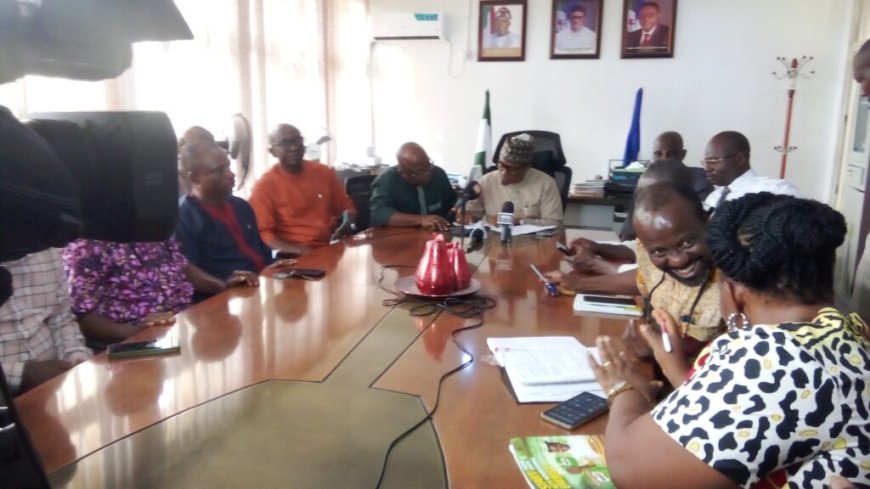The Cross River State Government is taking bold steps to reposition the state as a leader in agricultural exports, with coffee farming emerging as the newest addition to the state’s export-focused agricultural roadmap.
This was the key thrust of a stakeholders’ meeting organized by the Ministry of Agriculture and Irrigation Development, held in Calabar, which brought together government officials, agricultural associations, and farmers to discuss the integration of coffee into the state’s farming ecosystem.
Declaring the meeting open, the Honourable Commissioner for Agriculture and Irrigation Development, Hon. Johnson Andiambey Ebokpo, stated that Governor Bassey Otu’s administration is determined to transform agriculture from a subsistence activity to a globally competitive enterprise. According to him, the government has already procured tractors and complementary equipment to promote mechanized farming across registered farming clusters in the state.

“We are not romanticizing agriculture,” Ebokpo declared. “We are positioning it as a business. Mechanization is not just about ease—it’s about quality, quantity, and speed. That is why His Excellency has approved the procurement and distribution of tractors and implements to organized farming clusters. This will reduce drudgery, boost productivity, and elevate our farmers to export-focused players.”
Ebokpo emphasized that Cross River is responding to global market demands. With coffee prices surging internationally, the government has prioritized it as a high-value crop that complements cocoa, cassava, and oil palm already cultivated in the state. He added that the roadmap includes training, value chain development, and market access. “We are targeting the global export market. Coffee is no longer just a beverage; it is a billion-dollar opportunity,” the Commissioner stated.
In alignment with this vision, the Cross River State chapter of the Cocoa Farmers Association of Nigeria (CFAN) announced its readiness to integrate coffee into existing cocoa plantations. Dr. Ndep Tiku Ramson, State Chairman of CFAN, explained that cocoa and coffee flourish in the same environment and offer alternating harvesting seasons.

“When cocoa is in its off-season, coffee begins to yield. This gives our farmers a stable income throughout the year,” he said. “We’re seeing a global upsurge in coffee pricing, and this presents a golden opportunity for our members. We’re ready to educate and mobilize our communities to key into this initiative.”
Also speaking at the event, the State Chairman of the Oil Palm Growers Association of Nigeria (OPGAN), Rev. Ojikpong Nyiam Bisong, praised the government’s renewed commitment to agriculture and described the introduction of coffee as both historical and strategic.
“Coffee used to be grown in our compounds in the past until it was forgotten. Today, it is being reintroduced as a serious economic crop. The synergy between coffee and oil palm is particularly exciting—coffee enriches the soil, reduces weed pressure, and boosts palm yields,” Rev. Bisong explained. “With sprouted nuts already being nurtured in nurseries, and the first planting phase expected by the 2026 rainy season, we are looking at a sustained, multi-year rollout. It is not a one-off program—it is phased to ensure continuity.”
He stressed that the program now enjoys a structure that guarantees sustainability beyond any administration, thanks to the involvement of registered and committed farmers across the state. “The presence of coffee will not only boost income but also reduce youth idleness by promoting household-based agriculture,” he added.
Dr. Assam Assam, Cross River State Chairman, National Coffee and Tea Association of Nigeria, described the integration of coffee as a masterstroke. He called on farmers and stakeholders to take advantage of the initiative, noting that the global coffee industry is currently booming.
“The time for subsistence farming is over. Agriculture must be treated as business. This move is about creating wealth, not just food,” Dr. Assam stated. “We are laying a foundation that will position Cross River as a strong player in the international commodity market.”
Stakeholders across the board hailed the initiative as timely and strategic, noting that the blend of coffee, cocoa, oil palm, and cassava—supported by mechanization, training, and market access—signals a new era for Cross River’s agricultural economy.
Ebi Collins, Beagle News









